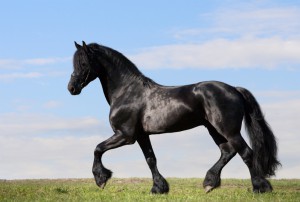 When looking after breeding males, keeping the stallion healthy and fertile is of paramount importance. In order to perform well, whether it is natural covering or AI reproduction, a Stallion must be physically fit, and of a moderate body condition. If their condition is too poor and they may not have the energy to perform adequately, and too much fat increases risk of heart problems and metabolic diseases, puts additional strain on hind joints during covering and may reduce fertility. For this reason, among others, correct nutrition is of vital importance for ensuring that your Stallion is able to breed successfully. During covering season (usually Feb-July in the UK), the nutritional requirements of a Stallion will normally increase by up to 25%, depending on their workload. Traditionally this demand was met from feeding mixes and cereals. However, it is important to remember that stallions are just as susceptible as mares and geldings to excessive starch consumption related issues, such as gastric ulcers. As with all horses, the diet of a stallion should be based around high quality forage, fed at a minimum of 1.5-2% bodyweight. During the summer being turned out on a good quality pasture should satisfy these forage needs. To meet additional energy requirements, unmolassed sugar beet and alfalfa chaff are an ideal feed that also provide a quality protein source, and to this is it advisable to add to this a multi vitamin and mineral supplement to ensure that all micronutrients needed for a healthy reproductive system are being supplied. Fertility boosters? Many supplements claim to help to boost fertility in Stallions, but often there is little evidence to substantiate these declarations! However, research has shown that supplementing the diet with Omega -3 fatty acids increases the percentage of healthy sperm cells, increases sperm output, improves motility, and (very importantly for AI stallions), it has been shown to help improve sperm cell membranes, making them better able to withstand cooling or freezing processes. If wanting to feed a supplement to help with sperm cell health, it is important to remember that, even though sperm is produced in large quantities every second, an individual spermatozoa takes 54-57 days to mature and develop, so it is wise to start feeding Omega-3 rich feeds, such as linseed, at least 2 months prior to the covering season to ensure maximum fertility.
When looking after breeding males, keeping the stallion healthy and fertile is of paramount importance. In order to perform well, whether it is natural covering or AI reproduction, a Stallion must be physically fit, and of a moderate body condition. If their condition is too poor and they may not have the energy to perform adequately, and too much fat increases risk of heart problems and metabolic diseases, puts additional strain on hind joints during covering and may reduce fertility. For this reason, among others, correct nutrition is of vital importance for ensuring that your Stallion is able to breed successfully. During covering season (usually Feb-July in the UK), the nutritional requirements of a Stallion will normally increase by up to 25%, depending on their workload. Traditionally this demand was met from feeding mixes and cereals. However, it is important to remember that stallions are just as susceptible as mares and geldings to excessive starch consumption related issues, such as gastric ulcers. As with all horses, the diet of a stallion should be based around high quality forage, fed at a minimum of 1.5-2% bodyweight. During the summer being turned out on a good quality pasture should satisfy these forage needs. To meet additional energy requirements, unmolassed sugar beet and alfalfa chaff are an ideal feed that also provide a quality protein source, and to this is it advisable to add to this a multi vitamin and mineral supplement to ensure that all micronutrients needed for a healthy reproductive system are being supplied. Fertility boosters? Many supplements claim to help to boost fertility in Stallions, but often there is little evidence to substantiate these declarations! However, research has shown that supplementing the diet with Omega -3 fatty acids increases the percentage of healthy sperm cells, increases sperm output, improves motility, and (very importantly for AI stallions), it has been shown to help improve sperm cell membranes, making them better able to withstand cooling or freezing processes. If wanting to feed a supplement to help with sperm cell health, it is important to remember that, even though sperm is produced in large quantities every second, an individual spermatozoa takes 54-57 days to mature and develop, so it is wise to start feeding Omega-3 rich feeds, such as linseed, at least 2 months prior to the covering season to ensure maximum fertility.
I cookie ci aiutano a offrire i nostri servizi. Utilizzando i nostri servizi, acconsentite al nostro utilizzo dei cookie.











